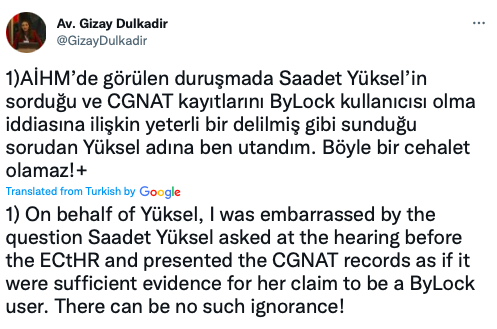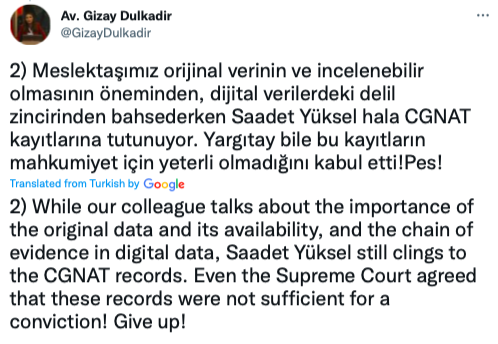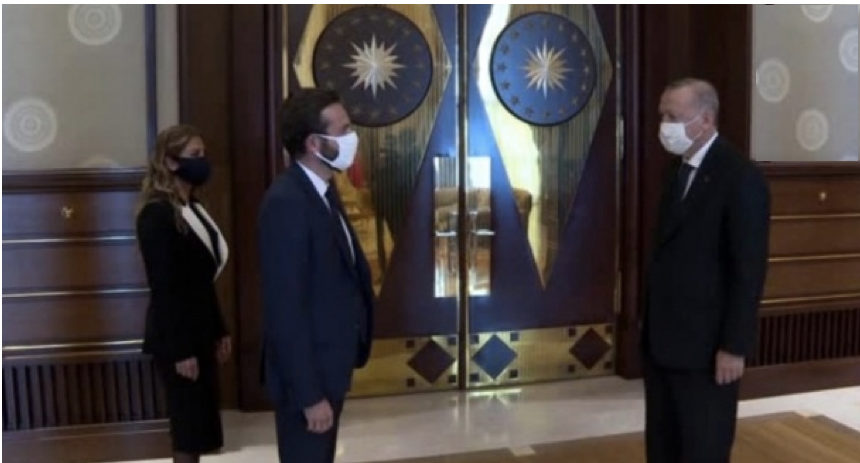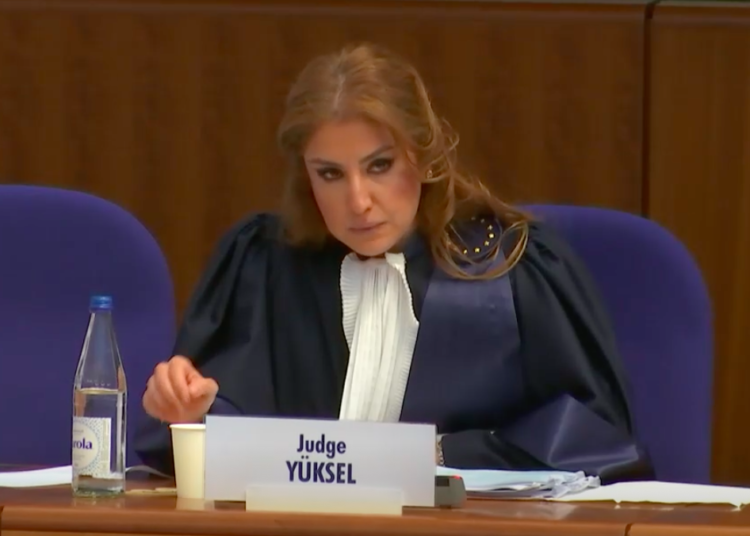Levent Kenez/Stockholm
The Grand Chamber of the European Court of Human Rights (ECtHR) convened on Wednesday to hear the case of Turkish teacher Yüksel Yalçınkaya, who was fired from his job by a decree-law and sentenced to more than six years in prison for membership in the Gülen movement following a coup attempt in 2016.
During the trial Saadet Yüksel, the judge representing Turkey on the court, asked a question in line with the Turkish government’s arguments about an encrypted messaging application that the Supreme Court of Appeals ruled did not constitute sufficient evidence of a crime. Human rights defenders and lawyers have described this as a scandal, demanding that Yüksel withdraw from the case.
The Turkish government accuses the Gülen movement of orchestrating the controversial coup attempt on July 15, 2016. The movement, however, strongly denies any involvement.
The government accepted such activities as having an account at the Gülen-affiliated Bank Asya, holding an administrative position at a Gülen movement-linked institution, subscribing to the group’s publications, being a member of a trade union or other institution linked to the Gülen movement and using the encrypted messaging application ByLock as benchmarks for identifying and arresting tens of thousands of followers of the Gülen movement on charges of membership in a “terrorist” organization.
Yalçınkaya, who was accused of using ByLock, having an account at Bank Asya and membership in a movement-affiliated union, filed an individual application at the Constitutional Court after his conviction was upheld by the Supreme Court of Appeals. The country’s top court ruled against him, upon which Yalçınkaya applied to the ECtHR in 2020. In his application he argued that the decisions rendered by the Turkish courts were contrary to the articles of the European Convention on Human Rights on “fair trial,” “no punishment without law,” “respect for private life” and “freedom of association.”
At the hearing Yalçınkaya’s lawyers explained how the ByLock data was was obtained illegally and could not be used as evidence. Stating that ByLock was an application that was available to everyone, lawyers said it was downloaded by approximately 600,000 people all around the world. “The ByLock data was obtained by the National Intelligence Organization [MIT] without a warrant, and the plaintiff’s requests to show him the data or for it to be examined by an expert were denied,” his lawyers told the judges.
They also said the raw ByLock data was not given to the courts during Yalçınkaya’s trials, that it was processed by MIT and that therefore the integrity of the data was damaged so could not be considered legal evidence.
Yüksel’s question during the trial:
However, Judge Yüksel, who is expected to be impartial, said there were expert reports based on CGNAT that the defendant had downloaded the ByLock application and that he had repeatedly connected to the ByLock server with his mobile phone. She asked Yalçınkaya’s lawyers if they were asking the court to set aside the expert findings based on CGNAT.
CGNAT is a method used by internet providers to share a single unique public IP address with multiple users.
Yalçınkaya’s lawyer responding to Yüksel.
Gizay Dulkadir, former vice president of the Ankara Bar Association’s Human Rights Center, responded to Yüksel in a tweet that said, “ I am embarrassed that Saadet Yüksel presented the CGNAT records as if they were evidence to claim someone was a ByLock user. Even the Supreme Court of Appeals ruled that these records were not sufficient for a conviction.”


Legal expert Hüseyin Demir told the Kronos news website that “Saadet Yüksel must have seen Turkey’s defense as inadequate or incomplete because when asking Yalçınkaya’s counsel questions, she acted as if she were a lawyer rather than a human rights court judge.”
Dr. Gökhan Güneş commented on the development in a series of tweets, saying that Yüksel lost her impartiality with the question she asked to put the accused under suspicion and that she should withdraw from the case. Güneş also wrote that Yüksel spoke in Turkish with Turkish government agent Hacı Ali Açıkgül in front of the other judges and that this was unacceptable.
According to a decision by the 16th Criminal Chamber of the Supreme Court of Appeals in 2017, downloading the ByLock program is not sufficient evidence for a conviction. There must also be concrete evidence proving that the accused is a member of a terrorist organization.
The ruling is expected to be announced by the ECtHR later this year,
Nordic Monitor previously reviewed cases where Yüksel dissented from the majority opinion in which the applicants were critics of Turkish President Recep Tayyip Erdoğan taking a clear stance in line with local Turkish courts. Among these applicants were Selahattin Demirtaş, the former co-chairman of a pro-Kurdish opposition party, businessman Osman Kavala and journalists Kadri Gürsel and Ahmet Şık.
Expressing dissenting or partly concurring opinions on almost every decision, Yüksel addresses the politicized Turkish courts, even in cases in which she makes the same decision as the majority but argues that there is a lack of communication between the ECtHR and Turkey’s Constitutional Court. In applications made after the coup attempt in 2016, which led to a proliferation of major human rights violations in Turkey, she takes a position in favor of the Erdoğan government.
Following Yüksel’s appointment to the top court, human rights observers expressed concern about her impartiality given the close relations between her and Turkey’s ruling Justice and Development Party (AKP). Not only was her brother Cüneyt a former AKP lawmaker and deputy chairman, but Yüksel herself was affiliated with Islamist foundations supported by the Erdoğan government. She was also an assistant to and student of the late Burhan Kuzu, a chief aide and leading propagandist of President Erdoğan. Nordic Monitor previously published a report on Yüksel’s strong ties to the government.
Yüksel and former ECtHR President Róbert Ragnar Spanó were at the center of harsh criticism in September 2020. Spanó was the first ECtHR president to pay an official visit to Turkey, the government of which is a party to more than 16 percent of the cases before the Strasbourg court. Spanó and Yüksel met with President Erdoğan behind closed doors at his presidential palace.

Those who expected Spanó to give a strong message to top officials that Turkey must implement European court judgments and respect the rule of law were disappointed. Spanó made courtesy calls and received an honorary doctorate from Istanbul University, which has fired scores of academics in a massive crackdown since 2016, at a ceremony that students and journalists were not allowed to attend, at Spanó’s request. Spanó also went to Yüksel’s hometown of Mardin, a city in southeastern Turkey
French daily Le Monde claimed that Yüksel and Spanó are close friends, implying that their relationship is more emotional than professional.












